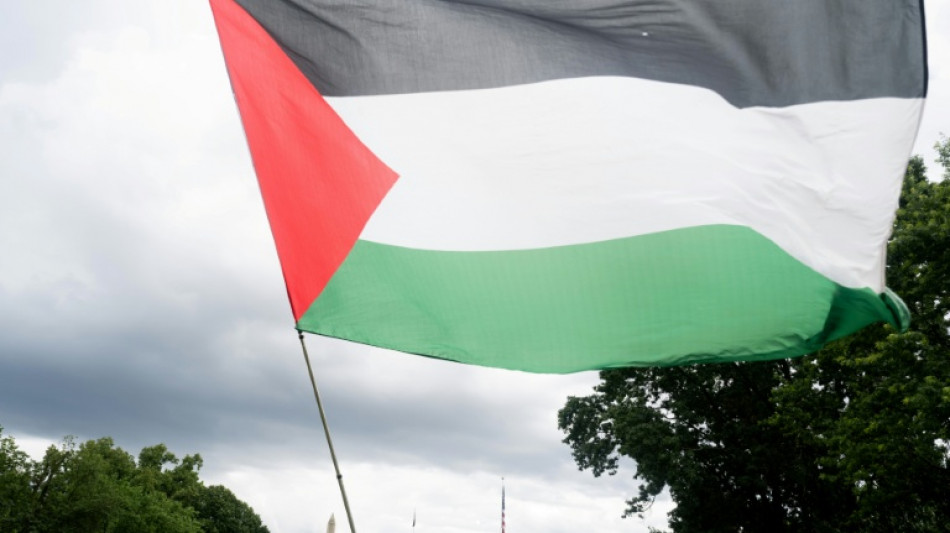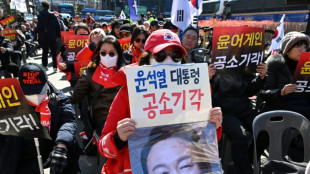

Trump weighs involvement as Israel launches fresh strikes on Iran
President Donald Trump warned he was weighing US military action against Iran, as Israel launched fresh strikes against Tehran on Thursday.
As the war entered its seventh day, Israel's military said it was striking Tehran and other parts of Iran, but all eyes were on whether Washington would enter the fray.
Iran's supreme leader Ayatollah Ali Khamenei meanwhile rejected Trump's demand for an "unconditional surrender", despite claims from the US leader that "Iran's got a lot of trouble and they want to negotiate".
Trump has left his intentions on joining the conflict deliberately ambiguous, saying Wednesday: "I may do it, I may not do it. I mean, nobody knows what I'm going to do."
"The next week is going to be very big," he added, without further details.
The White House said Trump would receive an intelligence briefing on Thursday, a US holiday. Top US diplomat Marco Rubio meanwhile will meet his UK counterpart for talks expected to focus on the conflict.
"I have ideas as to what to do, but I haven't made a final (decision)," Trump said. "I like to make the final decision one second before it's due, because things change. Especially with war."
The Wall Street Journal reported that Trump had told aides on Tuesday he had approved attack plans but was holding off to see if Iran would give up its nuclear programme.
Trump told reporters that Iranian officials "want to come to the White House", a claim denied by Tehran.
The US president had favoured a diplomatic route to end Iran's nuclear programme, seeking a deal to replace the agreement he tore up in his first term.
But since Israeli Prime Minister Benjamin Netanyahu unleashed the campaign against Iran one week ago, Trump has stood behind the key US ally.
The United States is the only country with the "bunker buster" bombs needed to destroy Iran's Fordow nuclear plant, but US military action is deeply unpopular with parts of Trump's base.
Khamenei on Wednesday insisted Iran "will never surrender," and called Trump's ultimatum "unacceptable".
"America should know that any military intervention will undoubtedly result in irreparable damage," Khamenei added.
- Dozens of civilians killed -
A week of strikes has significantly degraded Iran's nuclear and military installations, including buildings making and testing centrifuge components in Karaj and Tehran.
Centrifuges are vital for uranium enrichment, the sensitive process that can produce fuel for reactors or, in highly extended form, the core of a nuclear warhead.
Iranian strikes have also caused damage in Israel, where at least 24 people have been killed and hundreds wounded, according to Netanyahu's office.
Iran said Sunday that Israeli strikes had killed at least 224 people, including military commanders, nuclear scientists and civilians. It has not issued an updated toll since then.
On Thursday morning, Israel said it was carrying out fresh strikes on Tehran and other parts of Iran, and warned civilians in two villages, Arak and Khondab, to leave ahead of new attacks.
Those strikes came after Israel said it had destroyed Iran's internal security headquarters in Tehran, and Iran unleashed Fattah hypersonic missiles and so-called super-heavy, long-range missiles.
An Israeli military official, who asked not to be named, said Wednesday that Iran had fired around 400 ballistic missiles and 1,000 drones since the conflict began on Friday.
About 20 missiles had struck civilian areas in Israel, the official added.
Israel says its surprise air campaign is aimed at preventing Iran from acquiring nuclear weapons.
Iran theoretically has enough near-weapons-grade material, if further refined, for more than nine bombs, but it denies seeking nuclear weapons.
Israel has maintained ambiguity on its own atomic activities, but the Stockholm International Peace Research Institute says it has 90 nuclear warheads.
- 'Immediate de-escalation' -
Israel's strikes have prompted mass evacuations and food and fuel shortages in Iran.
"There are shortages of rice, bread, sugar and tea," a 40-year-old Iranian driver told AFP at the Iraqi border crossing of Bashmakh, seeking anonymity for fear of reprisals.
"People are shocked and distraught, they don't know what they should do," said a car dealer in the Iranian city of Bukan who also asked not to be identified by his real name.
There was also a "near-total national internet blackout" in Iran on Wednesday, a London-based watchdog said, with Iran's Fars news agency confirming heavier internet restrictions after initial curbs imposed last week.
The military campaign has sparked calls for a return to diplomacy, with UN chief Antonio Guterres on Thursday urging an "immediate de-escalation" and efforts to avoid "further internationalisation of the conflict."
Russian President Vladimir Putin said Thursday that a deal to guarantee both Israel's security and Iran's desire for a civilian nuclear programme was possible.
"I believe it would be good for all of us together to look for ways to stop the fighting and seek ways for the participants in the conflict to find an agreement," he told foreign journalists at a televised event.
He said Iran had not asked Russia for military help.
But there were lingering questions about how the conflict could evolve, with Trump telling reporters that a change in Iran's government "could happen", a day after he had boasted that Washington could assassinate Khamenei, but would not, "at least not for now".
burs-sah/lb
S.Rovigatti--IM



